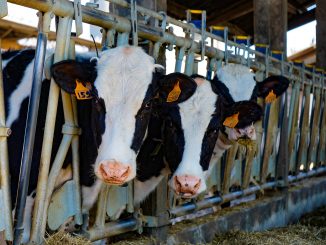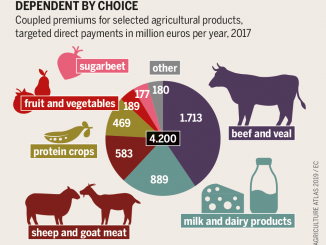
Today, over 3,600 scientists from all EU countries have together declared that the post-2020 CAP fails to reverse damage to the environment and restore nature and must be “drastically improved.” Addressing the European Parliament, Council and Commission they argue for a future-proof, evidence-based CAP, proposing ten urgent action points to ensure biodiversity conservation, climate mitigation and sustainable food production.
In a position paper published in the People and Nature journal today, the scientists argue that whilst the proposed post-2020 CAP opens the possibility for improved sustainability, it also allows Member States to choose low-ambition measures, resulting in a feared race-to-the-bottom in terms of environmental protection, in particular. Expressing concern about “current attempts to dilute the environmental ambition of the future CAP, and the lack of concrete proposals for improving the CAP in the draft of the European Green Deal,” their ten action points are supposed to guide a more ambitious CAP reform, supported by science.
The full article can be downloaded here.
The position paper is written by twenty-one ecologists, economists and agricultural scientist and was coordinated by scientists from the German Centre for Integrative Biodiversity Research (iDiv) the Helmholtz Centre for Environmental Research (UFZ) and the University of Rostock. This paper and the ten action points for a sustainable and fair CAP delineated therein are signed by a further 3,600 scientists. (The full list can be found here.) They have received wide scale support from civil society organisations across the continent.
Main concerns
Analysing the Commission’s CAP reform proposals, the authors of the article argue that the key shortcomings and structure of the current CAP are maintained. They include:
- “Continuation of subsidies through area-based ‘Direct Payments’ (in Pillar 1) with low levels of environmental requirements.
- Budget cuts for Rural Development Programmes (so-called Pillar 2) including Agri-Environment-Climate Measures (AECM).
- Misleading claims attached to insufficient climate action.
- A ‘Green Architecture’ with vague requirements allows MSs and farmers to choose unambitious (‘light green’) options.
- Insufficient set of indicators.
- Extending insurance instruments without a link to risk mitigation can promote unsustainable, risk-prone behaviour.
- Lack of consistency and transparency.”
“The EU is contradicting itself by asserting that the next CAP will be better for the environment and rural areas, while at the same time, cutting the budget for doing just that,” says Pe’er.
Ten action points
In order to avoid reiterating these shortcomings, the article recommends that the European Commission, Parliament, the Council and Member States “use the breadth of scientific knowledge and experiences from past CAP reforms for drastically improving the CAP in order to avoid a policy failure and further ineffective use of taxpayers’ money.”
They go on to say “as an overarching target, all CAP elements, without exception, should be aligned with the principles of sustainability, multi-functionality and public payments for public goods” and propose ten urgent points of action, to focus 40% of the EU budget on public goods and services, thereby improving the management of 50% of EU land area.
The points of action are:
- “Transform Direct Payment into payments for public goods, to align both environmental and socio-environmental dimensions of sustainability, given the poor performance of Direct Payments for both.
- Provide sufficient support for effective climate change mitigation, aiming to reduce GHG emissions in the agricultural sector with a focus on improved nitrogen fertilizer application, rewet-ting of peatlands and improved GHG balances from livestock husbandry.
- Provide sufficient support for effective instruments to maintain biodiversity and ecosystems, aiming to halt and reverse on-going declines in farmland biodiversity.
- Promote innovative approaches to design and implement meas-ures addressing the environmental challenges, such as result-based remuneration of AECM,…collective measures to support landscape-level management … or the introduction of a points system to reward farmers for their ambition and/or investments, as also proposed by several farmer organizations.
- Enhance spatial planning and collaborative implementation of landscape-level measures, as such approaches have been shown to be successful with respect to environmental aims.
- Require MSs to set S.M.A.R.T. targets in their Strategic Plans (i.e. specific, measurable, ambitious, realistic and time-bound; Green et al., 2019) in order to fulfil all CAP objectives.
- Revise the set of indicators to ensure they are supported by the best available science and comply with the indicators of the Sustainable Development Goals (SDGs), the Convention for Biological Diversity (CBD) and the United Nations’ Framework Convention on Climate Change (UNFCCC).
- Strengthen environmental monitoring and enforcement to ensure that CAP instruments lead to desirable results.
- Identify and address global impacts of the CAP especially in the global South, to achieve a reduction of environmental leakage and global negative land-use effects as well as market distortions by EU agriculture, and to comply with the EU’s principle of ‘Policy Coherence for Development.’
- Improve governance of the CAP and its reform in order to enhance transparency, accountability, participation and knowledge-uptake in line with SDG 16, and thereby regain legitimacy and public trust.”
Further details on each of these action points as well as the related targets and implementation can be found here..
The authors close asserting that “business as usual is no longer an option. Urgent and efficient actions are needed to ensure environmental and social sustainability and long-term food security. Transforming the CAP to help farmers adapt to the sustain-ability challenges would serve as a landmark for the new European Commission and the Green Deal, but it will require political courage to overcome a resistance to change.”







4 Trackbacks / Pingbacks
Comments are closed.